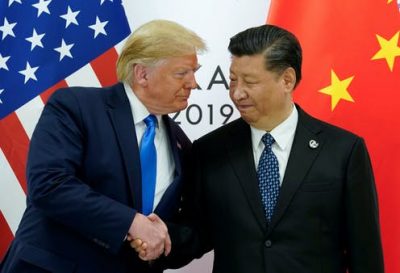Trump’s Threat to End Relations with China: Is It a Distraction From His Coronavirus Mishandling?

The anti-China campaign in the U.S. is nearing its climax. Republican Senator Marsha Blackburn wrote a letter to colleagues calling for them to be careful when working with Chinese officials, or better, to avoid contact with them. Last week, Republican senators proposed a bill that would allow President Donald Trump to impose sanctions on China if there is no comprehensive review of China’s role in the spread of coronavirus. Lawmakers requested the investigation within 60 days, as well as confirm the closure of the so-called wet markets in China, in addition to the release of arrested Hong Kong rioters. They also propose to freeze Chinese assets in the U.S., impose travel bans, tighten visas, and restrict Chinese businesses from accessing U.S. banking and capital markets.
Washington continued its online visa war with China by limiting visas to Chinese journalists working in the U.S. for 90 days. Chinese media outlet Xinhua called the decision an unprecedented act of discrimination and pressure on Chinese journalists. This completely exposed the false pretence of the U.S. claims of “freedom of the press,” a spokesperson of the agency said.
Trump’s announcement yesterday that the U.S. could completely end its relationship with China due to the pandemic has seen China harshly reacting, with suggestions that itself might put sanctions on the U.S.
U.S. Secretary of State Mike Pompeo also called on alleged forces related to China to stop stealing coronavirus research data after the FBI and the U.S. Department of Homeland Security made the accusation. It is likely however that Trump uses the charges against China primarily for his own political purposes as he lost complete control of the coronavirus that has seen over 1.5 million Americans infected and around 90,000 dead.
For the sake of winning the upcoming election he will continue to target China, but will unlikely break ties with Beijing because American businesses will lose a market of 1.4 billion people. The pandemic has shown that the U.S. has missed an opportunity to be a world leader which will now force Washington to rethink its position in the world.
The U.S. understand they have a long way to go before reaching the end of the pandemic. Meanwhile, China is approaching the end of it. Economically, China is winning which is why Washington is trying to curb China politically. It is for this reason Washington is now using the “Taiwanese card.”
Pompeo said World Health Organization Director-General Tedros Adhanom Ghebreyesus “chose not to invite Taiwan under pressure from the People’s Republic of China. The Director-General’s lack of independence deprives the Assembly of Taiwan’s renowned scientific expertise on pandemic disease, and further damages the WHO’s credibility and effectiveness at a time when the world needs it the most.”
Washington’s focus on China is a distraction, a relatively simple way to disguise their own faults, and the charges against the WHO serves the same purpose. It is passing on the blame of Trump’s inefficient handling of the pandemic just as we push closer to the next U.S. elections.
Member states of the Five Eyes intelligence structure, the United States, Australia, New Zealand, the United Kingdom and Canada, or what should be more accurately called the Anglo Five, also contributed to the campaign against China. These countries support the U.S. call for an inquiry into the role of WHO and China in the fight against the pandemic, and some, despite Beijing’s strong opposition, have supported Taiwan’s invitation to join the World Health Assembly. According to Canadian radio company CBC that quoted a senior Canadian government official, French, German and Japanese ambassadors at the United Nations in Geneva, along with Canadian, Australian, New Zealand, British and the American ones at a meeting with senior WHO officials voiced support for inviting Taiwan to join this international organization
Despite the provocations and using Taiwan provocatively, the People’s Bank of China issued a license to Fitch Bohua, owned by U.S. company Fitch Raitings, to conduct business in the Chinese market, according to information released on May 14. The company is allowed to value some bonds in China’s interbank stock market. The acceptance of Fitch Raitings into the Chinese market is part of the first phase agreement of China-U.S. trade. In addition, as part of this transaction, the Chinese government today will cancel additional import duties on the second shipment from the U.S.
However, Chinese state-owned Global Times, considered an influential voice in Chinese policymaking, said Beijing is running out of patience. It appears China could be deliberately leaking information to the media and is planning serious sanctions, particularly against two organizations and several individuals who have sued China in U.S. courts. The Chinese outlet explained how to inflict the most painful economic damage on these American organizations and individuals, and urged Beijing to do this instead of making angry statements and symbolic gestures.
It is unlikely that China, or even the U.S., will sever relations or impose sanctions. Although the U.S. political class may be against China, for the billionaires and major business owners, anti-Chinese actions are against their own financial interests. For this fact, it is likely Trump is only using strong rhetoric in the lead up to the upcoming election to distract Americans from his own mishandling of the pandemic.
*
Note to readers: please click the share buttons above or below. Forward this article to your email lists. Crosspost on your blog site, internet forums. etc.
This article was originally published on InfoBrics.
Paul Antonopoulos is an independent geopolitical analyst.
Featured image is from InfoBrics

